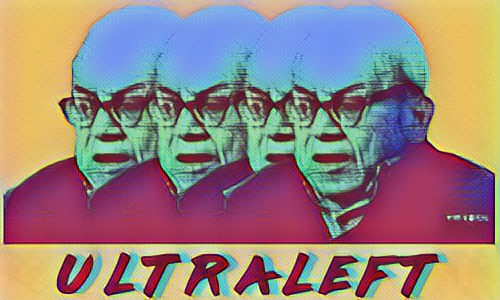Neocosmism
Russian cosmism is a philosophical and cultural movement that emerged in Russia at the turn of the 19th century, and again, at the beginning of the 20th century. Russian Cosmism, is a highly controversial and oxymoronic blend of activist speculation, futuristic traditionalism, religious science, exoteric esotericism, utopian pragmatism, idealistic materialism-higher magic partnered to higher mathematics.
Main themes in Russian Cosmist thought include the active human role in human and cosmic evolution; the creation of new life forms, including a new level of humanity; the unlimited extension of human longevity to a state of practical immortality; the physical resurrection of the dead; serious scientific research into matters long considered subjects fit only for science fiction, occult, and esoteric literature; the exploration and colonization ofthe entire cosmos; the emergence on our biosphere of a new sphere of human thought called the "noosphere"; and other far-reaching "projects:' some of which may no longer seem as impossible or crazy as they did when first proposed in the late nineteenth and early twentieth centuries.
Konstantin Tsiolkovsky (1857–1935) was among the pioneers of theoretical space exploration and cosmonautics. In 1903, Tsiolkovsky published the first serious scientific work on space travel. His work inspired further research, experimentation and the formation of the Society for Studies of Interplanetary Spaceflight. Tsiolkovsky wrote a book called "The Will of the Universe; Unknown Intelligent Forces" in which he propounded a philosophy of panpsychism. He believed humans would eventually colonize the Milky Way. His thought preceded the Space Age by several decades, and some of what he foresaw in his imagination has come into being since his death. Tsiolkovsky did not believe in traditional religious cosmology, but instead he believed in a cosmic being that governed humans.
Russian cosmism was devoted to ideas such as cloning and genetic engineering so that we could reconstruct organisms in a type resurrection. Indeed, they wanted to enact the Christian mission to restore life through resurrection by the means of science. These were primarily the ideas of Fyodorov. I refer to this historical tradition as paleocosmism.
Some organized around the image of the universal 'Proletarian', who strides forth from the earth to conquer planets and stars. This paleocosmism is the antecedent to the cosmic citizen of neocosmism.
Neocosmism promotes technology as the common task of humankind. In order to achieve a New Humanity, neocosmists strive to overcome the human, and eventually balance transhumanist and deep ecologist principles. Neocosmism takes human migration to space as an inevitability and closely studies resurrection and immortality. It also centers an ethical and moral system that emphasizes co-existence and co-evolution by combining post-Christianity and other mysticisms.
We must move beyond the Marxist classist paradigm. Move beyond the Anarchist individualist paradigm. Move beyond the Intersectionalist identity paradigm. Therefore, embrace the cosmic citizen paradigm of neocosmism.
Neocosmism views people as relating to one another as cosmic citizens. A relationship in which people are not bound to any arbitrary delineation. But rather, all are celebrated as cosmic citizens in which the very unfolding of consciousness, reason, and knowledge forms the basis of relating. Dialectics is a concept normally associated with Hegel’s philosophical theory of the progress of ideas through thesis, antithesis and finally synthesis. Marx took up the reins of dialectical thinking – emphasizing contradictory relationships and their role in change and progress – but applied it to the material conditions and struggles of society, rather than the realm of ideas. It is Bookchin’s concept of dialectics that is best suited to our purpose, however. Dialectics for Bookchin was about acknowledging the interactions, especially between humans and nature, in which, because of their intimate relationship, a change in one caused a change in the other as the two became intertwined. Linking the cosmos and society by asserting that both of them operate in a ‘dialectical’ fashion is therefore a useful way of starting analysis.
Dialectics stresses the interactions between the observer and the observed or between the subject and the object. We may thereby explore the dialectic between cosmos and the self. By physically interacting with the cosmos, humans are transforming themselves once more. As societies interact with nature, human beings start changing themselves. Put in more sociological and material terms, as societies observe and modify external nature they start modifying their own, internal, nature. Likewise, when humans interact with the cosmos, their inner cosmology is changed. And this is a dialectical process that gives rise to cosmic citizenship.
Neocosmism is in between the citizenships of Heaven and Earth. Neocosmism is fundamentally about the multidimensionality of citizenship. It opens the belonging to both ecology and technology. While it can be historically traced to its “paleocosmism” precedent with respect to Russian cosmism. Neocosmism is not as much a transhumanist philosophy as it is a “cosmic” philosophy - thereby incorporating deep ecological principles.
Ultimately the “cosmician” is the pinnacle of the New Humanity. As cosmic consciousness is raised, so is the cosmic citizen. A new means of relating to one another for the purpose of building a truly liberatory and egalitarian society. A society to emerge from evolutionary blueprints for grand experiments in living.
It is the ultimate answer to the quest for alt-centrism. The neocosmic perspective describes all that is in heaven and earth. It is the highest of political centering for the rest of a philosophical paradigm.
Neocosmism embraces all possibility in terms of a political philosophy. With the philosophical disposition of possibilism, one knows that in plurality is the seed of liberation. From a shifting focus on limitless horizons to protective boundaries, births the Up Wing and Down Wing ideological polarity. The dynamic connectedness of ideological play then gives rise to the meaning of Alt-Centrism. This is a belief that pulling from the fringes of ideologies rather than their centers is what accounts for a most cohesive synthesis. Furthermore, utopian pragmatism executes the world-building theses of the ideological imaginary in the most real world implementation of Minarcho-Councilism. Neocosmism is the higher order political philosophy behind the realization of the practical politics of Minarcho-Councilism.
Neocosmism attempts to offer a systemic overview of the new post-liberal, post-Marxist, post-anarchist politics. At the heart of neocosmism is a critique of the consciousness we all supposedly share, a "culture-complex” that has kept us all trapped in lower consciousness. The six sides of the "culture complex" are said to be: patriarchal attitudes, egocentricity, scientific single vision, the bureaucratic mentality, xenophobia, and the fear of nature.
Since consciousness ultimately determines our institutions, “oppressive” consciousness is said to be ultimately responsible for "monolithic" institutions that offer us little in the way of freedom of choice or connection with others. To explain how to break free of the “culture complex” and its institutions, neocosmism develops a "cosmic citizenship" analysis that reveals the existence of a new means of relating.
Life-oriented individuals or cosmic citizens constitute an emerging new force in post-industrial nations. The new force is generating a "liberation" consciousness consisting of androgynous attitudes, spirituality, multiple perspectives, a cooperative mentality, local-and-global identities, and an ecological outlook. To transform “domination” society, the cosmic citizens will have to launch an "evolutionary movement" to replace – or at least supplement – monolithic institutions with life-affirming cosmic ones.



Comments
Post a Comment